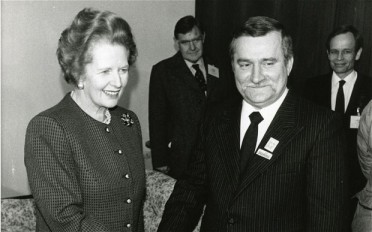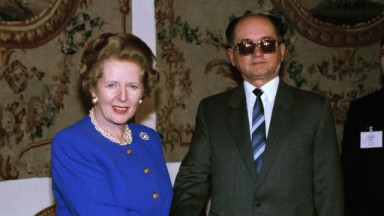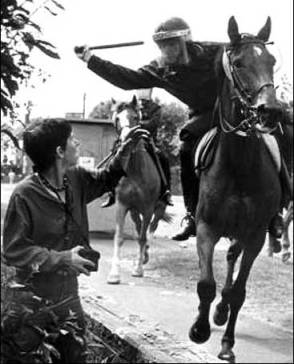The death of Thatcher has resulted in mixed reactions in the UK. In Poland I’ve seen a smidgeon of praise for her, including from Donald Tusk who follow the standard western right-wing line of her being “against communism” and her “support for Solidarity” and her eventual “victory”.
Accepting this narrative would require one to see contradictions in Thatcher’s actions in Poland. First, let’s look at this video:
That was in the November of 1988. This is the incident which is used to show her “help”. Now, I’m not saying that Solidarity did not gain from her visit. That hundreds of workers were chanting her name, and that people like Archbishop Jankowski were praising her contribution to Solidarity shows that she did have a beneficial impact upon Solidarity. In that November aid was offered to the Polish government on the condition of talking with Solidarity.
She wasn’t always so helpful towards Solidarity, though. 1981 saw the martial law come via the PM Wojciech Jaruzelski (who as Minister of Defense had ordered Polish troops to enter Czechoslovakia in 1968) , whereby thousands of opposition activists were interned without charge as up to 100 people were killed. Solidarity was itself declared illegal in 1982.
Thatcher was to be one of various western leaders who would do speeches in 1982 supporting Solidarity, but the period prior to the imposition of martial law saw her, as shown by the release of confidential German documents in 2012 to be “suspicious” of Solidarity, that she only backed Solidarity out of “respect for public opinion” and that in a usual situation the British government would be “on the side of the Polish government”. There was talk within the British government of helping the Polish government in repression against Solidarity if they get “out of control”. It could be argued that the lack of threat of reprisals against a potential imposition of martial law by the British government contributed to the likelihood of its existence. This was a dire time for Solidarity, and regarding Thatcher, they were walking alone when they most needed help.
This interesting article from the Margaret Thatcher Foundation of all places offers an explanation. Her opposition towards sanctions against Poland appears to be grounded in her concern for British businesses in the Soviet Union who were part (along with US firms) of building a gas pipeline in Siberia. In other words, she didn’t want to annoy the Soviets.
Now we come to the UK miners’ strike of 1984-85. This was a very bitter strike, very symbolic in attacking not just the coal industry, but trade unions in general. Thatcher arranged that coal be brought from Poland so that there would be stockpiles, thus helping the UK government to win against the miners. What that means, therefore, is that Thatcher was happy to do a deal with Jaruzelski. (Indeed, she was full of praise for him.)
Bear in mind that the Polish government had a very high foreign debt (over $20bn) at that time. In fact it was the bad financial situation of the 1970s that contributed greatly towards the establishment of Solidarity in 1980. To quote Norman Davies, “By 1976, it was clear that a depressed world market did not need substandard Polish exports, and that Polish industry was too inefficient to produce them at any rate. […] It was surprising that the regime lasted as long as it did“, (italics added by myself). Now, the world market in 1984 was not in so strong a depression (though most western countries were either in recession or just coming out of it), but the fact is that, when the government of Poland needed financial help in order to keep afloat, the government who had just a few years earlier had led to the death of opponents, Thatcher came in and helped them out.
Now, this article shows that Solidarity members were supportive of the miners on strike in the UK (Wałęsa was as well, though critical of miners’ violence, and was respectful of Thatcher. I’ll come back to him later). For example:
“The underground Provisional Co-ordinating Committee of Silesian miners sends you fraternal greetings and our support and solidarity for your struggle for the right to work
“We will do everything possible to support your struggle, including in action. The protest we have sent to the Polish government and Parliament is an initial measure taken in support of your struggle”.
(Solidarity miners in Silesia)
“The slave labour of the Polish miners serves to break the resistance of the British miners.
“British miners! In the prevailing conditions of terror, the. Polish workers movement is at present not in a position to undertake protest actions. But you may be certain that we are in solidarity with you”.
(Solidarity members in Warsaw)
“Neither the British government’s mounted police charges nor its truncheon blows, any more than the Polish junta’s tanks or rifle fire, can break our common will to struggle for a better future for the working class.”
(Solidarity members in Upper Silesia)
Wojciech Jaruzelski was therefore a scab whose decision to sell coal to Thatcher helped her to win the strike.*
Coming back to Thatcher’s visit in 1988 and the help it gave to Solidarity, one has to see that visit in the context of the time in Poland. Foreign debt was that year $39bn (despite the lack of British sanctions). The PRON attempt to gain the regime support was failing dismally. There were food shortages. The case of Father Popiełuszko was illustrative of a failing regime. That, for the first time ever in post-1945 Polish history the government were forced to admit that someone had been killed by its members and that these were put in prison showed a crumbling regime.
That is the context of Thatcher’s visit in 1988. To listen to some right-wing commentators, it’s as if she was playing for Solidarity and scored the winning goal. No. Solidarity were already winning. It’s as if that she came on in the 86nd minute and helped to energise the team to hold that lead. The spring and summer of 1988 saw many big strikes in Poland, and the effect was such that the communist authorities had to admit defeat and ask Wałęsa to ask strikes to go back to work. Out of this grew the Polish Round Table Agreement, from which came the end of communism. To use another metaphor, Thatcher was Sean Connery in “Robin Hood: Prince of Thieves”, coming into the film right at the end. Perhaps she simply saw which way the game was going and decided to get in the good books of Solidarity.
I don’t wish to downplay her role in helping end the communist state, but the fact is that her role was minor, compared with Solidarity, the Polish pope, the effect of Gorbachev and Jaruzelski himself.
A false dichotomy
There is seemingly a contradiction in Thatcher’s behaviour regarding Poland. How can someone who clearly works for capitalism do something that helps a communist state to last longer? How can someone so concerned with “personal freedoms” effectively countenance communist production and at the same time the poor pay of Polish miners? Even those Thatcher fans who manage not to ignore Thatcher’s support of Pinochet (of which more underneath) call it an “aberration”, when in fact, what she did in Poland and Chile is entirely consistent with her work as a class warrior on behalf not just personally on behalf of individuals who she trusted, but also impersonally on behalf of capitalism in all its contradictory, bringing riches-and-poverty, liberation-and-captivity, life-and-death self.**
It’s this that enabled her to do deals with Jaruzelski for her own benefit. It’s this that enabled her to support Pinochet, including for his free-market policies. It’s this that say her brand Nelson Mandela a “terrorist“. It’s this that saw her support the Khmer Rogue, after they had done a genocide. It’s this that saw her call Suharto a “friend“. (It’s similar with Reagan, after whom a square is named here in Wrocław; see the impact of his work in Central America.) As I wrote here, the pre-civil war Spain shows us capitalists and fascists working together, something respected by Maciej Giertych, a Polish MEP free-marketist, who is a fan of Franco and Salazar. It’s not personal, it’s just business. It’s capitalism. Even if that involves dealing with communists like Jaruzelski and the Khmer Rogue. Even if relative and absolute poverty increase in the UK she can justify her rule due to the benefits received by others.
Of course, unlike Franco and Pinochet, she didn’t set up concentration camps. On the authoritarian scale she’s not as high up as them, but under her the British police got politicised against what she termed as “the enemy within”, she created a culture of impunity that contributed to the cover-up of the police’s culpability for the death of 96 Liverpool fans at the Hillsborough disaster and was criticised for “bullying” colleagues.
The question isn’t whether someone or something is communist or capitalist. The question are rather, can people protest without facing police violence, do workers receive good pay, are states working against minorities (see the UK and Poland), are workers represented democratically and have a say in what happens to the produce they make***, are institutions authoritarian? The answers in Jaruzelski-era Poland and Thatcher-era GB are pretty similar, even if the extent to the answers are different.
Speaking of authoritarianism, Wałęsa himself was to prove to be anti-democratic and a scab (he said last year that a strike somewhere in Poland should end and that the police should intervene, I can’t find a link for that story though). Bożena Keff here (on pages 18 and 19) believes Solidarity to be less than democratic, in that she shows how RC members of Solidarity betrayed women members after 1989. Note how Archbishop Jankowski in the video praises Thatcher for being a “strong leader”. Communism has gone from Poland, but authoritarianism remains.****
In other words, in order to understand Poland now (and most western people are stuck in 1989) we need to look beyond this standard mindset. Lewica Wolnościowa and 161.info.cafe are just two organisations Polish that are leading the way.
* In addition to financial input that Jaruzelski received, states that called themselves communists have right from the start been happy to have deals with businesses (for example). Here I’m looking at left-wing criticisms of Stalinism and Real Socialism.
** This offers lessons for people opposed to Thatcher. Rather than seeing her as evil, or even as ground-breaking, it’s more fitting to see her as an embodiment of capitalism, a capitalism that isn’t like the X-Files (maintained by secret men behind closed doors) or The Silence (a demonic force which controls us) rather, we are capitalism. We gain (as Marx knew) benefits from it. We maintain it. An effective left-wing criticism of capitalism requires a handling of this irony. This enables us to understand why some people ignore all the bad that happened through her, in that they concentrate on the good.
*** Not just with workers’ representation only via party members in Poland, but also I question whether the British trade union system was effectively democratic, in that I believe positions of power to corrupt people, and prefer collectives.
**** The standard line is to blame communism for authoritarianism in Poland. There is truth in this, but I believe it owes itself to an old mindset of people such as parents, priests, politicians, professors and, err.. something else beginning with “p” should have more respect.




I haven’t read the entire entry. But I certainly will. A very interesting piece. This topic is totally swept under the rug.
Here’s what happens: 1. Event occurs, 2. media, authority figures constantly repeat one side of a story, 3. the population is convinced of a single truth, 4.true analysis many years later, may prove otherwise, but by then nobody is listening
Furthermore, the mentality of Poles is very flawed in dealing with capitalism. All of the sins of capitalism are present in Poland: corruption (yes, this is very much present in capitalist societies), materialism/consumption, greed, lack of political insight, and the most important… bias. Every capitalist country finds its population very biased towards one or another solution (whether they are informed or not). Examples abound on either side: lower classes defending pro-capitalist initiatives, even though it will hurt their own interests, and modern, hipsters propagating ecology by supporting pro-market green initiatives (even though behind these is a profit motive).